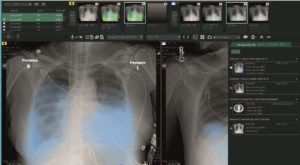Sponsored Content
At the onset of the pandemic, chilling reports and images from hard-hit Italian hospitals circulated worldwide. Operations and workflows of the hospitals were severely disrupted, increasing their workloads and stress due to the necessity of increasingly safe and separate diagnostic pathways and the need to constantly monitor the development of the disease after its onset. During the rapid spread of the coronavirus, there was growing interest relating to the role of diagnostic imaging, appropriateness of chest X-rays and CT scans when it comes to screening, detection and follow up management. Artificial intelligence has been found to be a useful supporting tool for managing the heavy workload, by offering the possibility of conducting examinations quickly and effectively to detect the presence of pulmonary parenchymal consolidation caused by the virus.

The Local Health Authority of Vimercate (Monza, Italy) is part of the Regional Health and Social Security System. For many years now, it has collaborated with international scientific institutes, such as the Healthcare Information Management Systems Society (HIMSS), with the aim of creating solid, long-lasting IT solutions and architectures to help the specialists improve their work. The architecture, technology and organization of the ASST of Vimercate are all designed to put the patient at the centre of the logistical, diagnostic and therapeutic pathways. The ASST covers an area of 1,121 km2, serving 1,205,000 inhabitants; every year, in particular, Vimercate Hospital processes more than 460,000 X-ray examinations.
When the epidemic reached this region, the hospital was in the midst of implementing artificial intelligence integrated into the RIS/PACS system. The set up included install of a parallel PACS fed by an artificial intelligence software that detects the main types of pulmonary disease (nodules, atelectasis, fibrosis, calcifications, cardiomegaly, etc.). In fact, this module has been updated to provide support in identifying the pulmonary parenchymal consolidation caused by the virus.
The installation of a dual software package enabled the daily workflow to continue uninterrupted, by activating the AI ecosystem on all the workstations at the disposal of the 17 radiologists and 24 technicians working at the facility. The system was implemented for emergency management on 28 March, and processed more than 600 examinations in its first five days of operation.
The analysis of chest X-rays with artificial intelligence integrated in the RIS system enables users to identify severe cases of lung disease and optimize the management of patients affected by COVID-19. In this period of emergency, Artificial Intelligence is used to process every chest X-ray analysis (first-aid patients with respiratory symptoms, patients admitted to hospital with COVID-19 and before discharging a recovered patient). The images to be reported come from the PACS installed at Vimercate Hospital, which sends them automatically to the parallel PACS integrated with AI. The artificial intelligence platform recognizes the type of examination and subjects it to analysis by the algorithm, which, in the case of pulmonary consolidation, assigns a score to it and returns the output to the AI platform. This innovative technology collects and reorganizes the examinations, detects positive cases rapidly. The output generated is viewed by the radiologists directly on the reporting list of the RIS, so that they have an indication of the examinations to be reported. The RIS does not give an immediate view of the findings of the artificial intelligence software to avoid the risk of bias.
“If no priority is set for the examinations to be reported, it may take hours to identify a particular X-ray, which could require prompt, immediate action by the doctors” – states Giovanni Delgrossi, Head of the IT Department of ASST of Vimercate.
The processing of CT scans and chest X-rays provides important support for radiologists, offering them an extremely rapid, quantitative and objective assessment of the zones of the lungs.
To learn more about AI and lung disease, visit the Christie Innomed booth at the upcoming CAR virtual conference.
Article adapted from REiLI User’s Review— ASST of Vimercate. Fujifilm Take Away. 30 June 2020.
